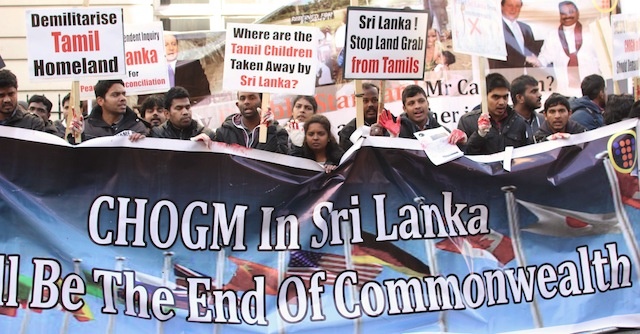
Advertisement
Advertisement
Aaditya, 23, civil engineer: Yes, in Jaffna and Colombo. Loads of people in my family have been affected at stages, in 2009 and moreso in the 1983 riots. My father’s house was burnt down during Black July. It’s weird, because it’s been going on for so long that you can always find some kind of effect on your life.Do you think there's been enough coverage of the conflict in the media?
I think it’s been covered more recently, but there's still an issue about the way they cover it or the lenses they see it through. There is a structural problem in the Sri Lankan constitution: Tamils just aren’t recognised as equal. They called it a "war without witness", but that’s because there were no international NGOs there at the final stages, just handfuls of Tamil journalists putting out stories. But their narrative got ignored.
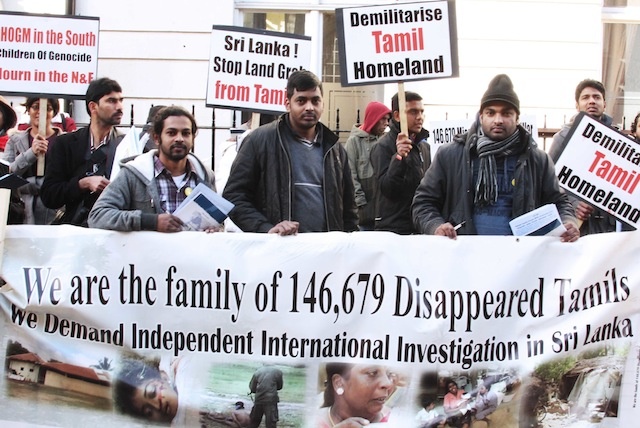
Advertisement
People can blame the Tigers for different things, but the reason I'm alive is because of them. If my family can live, it is because of them. If the Tamil community can ask for some rights, they have the voice to do so because of the Tigers' resistance. I would join them in an instant if I could. If international forces helped us, then a democratic struggle would work. But they aren’t, so it won’t. They just don’t care. A Sri Lankan politician cannot say they will give rights to Tamils as [that will make them lose] an election.I’ve read about sexual violence towards women being a big problem in Sri Lanka.
Rape is a really serious problem. It wasn’t just used in 2009 or after 2009 – it's been used since 1977 by the Sri Lankan army. When I lived there, I knew of girls who had been raped. Their mothers would come and sob to my mother. We would pretend we couldn’t hear what they were saying, because I didn’t want to embarrass them. It is pretty common. In one family my parents knew, they arrested the husband and took him away and raped his wife. I don’t know what happened to them.
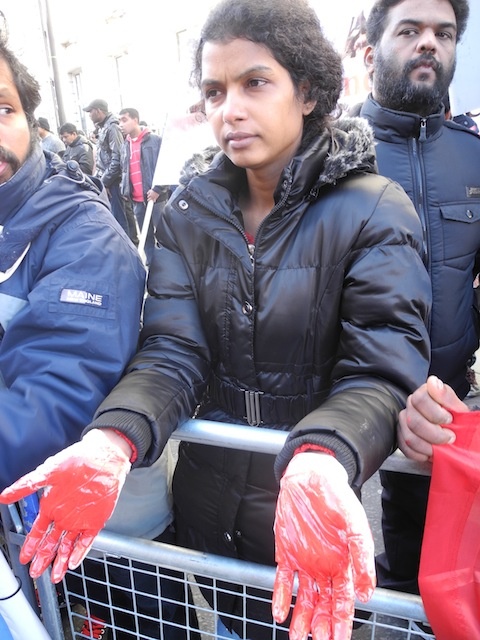
Padma, 23, works for a university: I wouldn’t agree with that. Even now, no Tamil people in Sri Lanka can speak to any foreign media. If the Sinhalese [Sri Lanka's largest ethnic group] speak up for Tamils, then they disappear or are killed.
Advertisement
To be honest, most people don’t even know the genocide has taken place. It’s very worrying that a huge number of people can be wiped off the planet and people don’t even know. In 2009, we were out protesting and I couldn’t believe it – no one knew what was happening in Sri Lanka, no media picked it up.-At the CHOGM, the Sri Lankan prime minister Mahinda Rajapaksa was appointed chairperson of the Commonwealth for the next two years. On Friday the 15th November, hundreds of Tamils living in the UK held a protest in central London against that piece of news. I headed along to speak to the protesters.
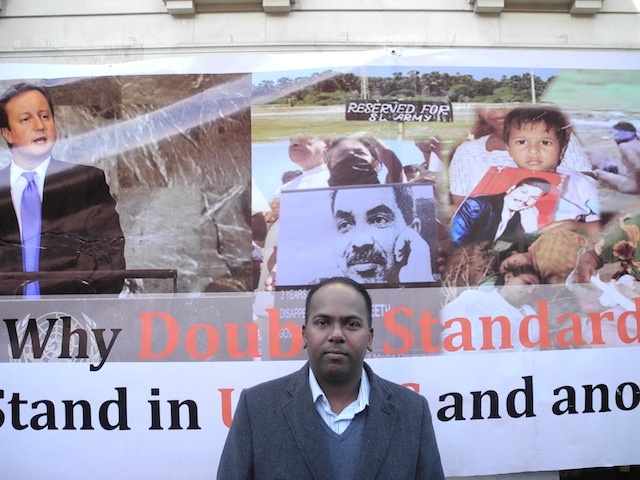
Raj Vakesan, Advocacy Coordinator for British Tamils Forum: I’m protesting while David Cameron is in Sri Lanka because we’ve been calling for a boycott of CHOGM but he didn’t listen. The prime minister always said that by going there he could shine a spotlight on the Sri Lankan human rights situation, but this has actually acted as PR for the Sri Lankan government. He said he would call for an international independent investigation or some sort of accountability mechanism to address the root cause of the conflict and the ongoing crime of genocide, but he hasn’t. His actions have endorsed the genocide and continued oppression, constant disappearances, rape and murders of the Tamils in Sri Lanka.
Advertisement

Vikram: In the last few months of the war we were displaced multiple times and we had no food. I saw so many people die, but because of the continuous shelling we couldn't even bury the dead bodies, we just had to leave them. It was terrible. I was arrested at the Omanthai checkpoint in May of 2009. I was interrogated and tortured – they tied my feet together, hung me upside down and beat me with sticks.What's the situation for your family in Sri Lanka like now?
Since I came to the UK my family members have been taken for interrogation several times. My father and brothers were all taken – they're constantly intimidated and they live in fear of persecution.
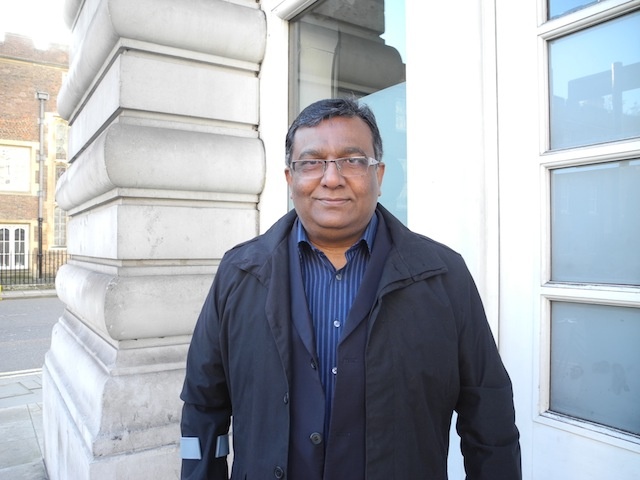
V Ravi Kumar, General Secretary of the British Tamils Forum: Day by day, the situation for Tamils in Sri Lanka is getting worse. The Sri Lankan government has an iron grip on the Tamils there – it's a totally militarised region. For every four Tamil civilians there's a soldier of the Sri Lankan army openly guarding them. There are also widespread human rights violations, such as sexual violence against innocent people, and there are massive land grabs going on. It's a complete programme of assimilation: the Sri Lankan state talks about reconciliation, but they're doing everything in their power to destroy the Tamil population.
Advertisement
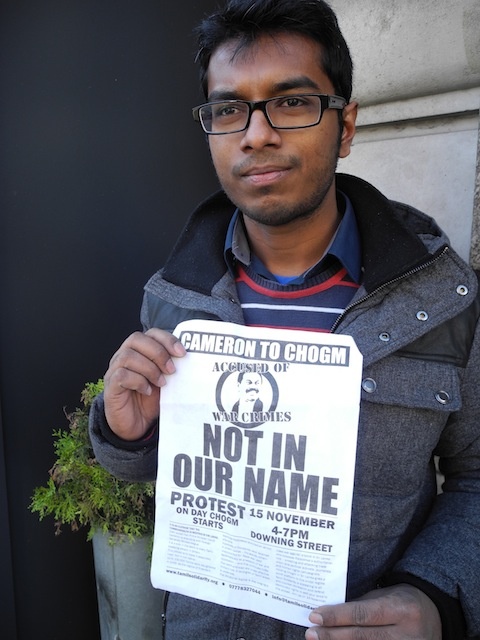
Keerthikan, from the Tamil Solidarity Campaign: The CHOGM taking place in Sri Lanka is a great insult and heart-breaking to the Tamil people, especially when we see David Cameron shaking hands with Rajapaksa. Rajapaksa has committed grave crimes against humanity. It is obscene that he should lead the Commonwealth, an institution that's supposed to value democracy and human rights.

"Lakshmi" was in Sri Lanka in 2009 and has since claimed asylum in the UK: It's not just since 2009 that Tamils have been affected – this has been going on my whole life. When I was four, my father was shot dead by the Sri Lankan army. My mother went through such hardship to bring us up; the army tortured her many times because they thought my dad had been in the Tamil Tigers. They could do whatever they wanted, especially because we lived in a rural village.For example, when I was a teenager they came to our village all the time and raped and attacked young girls. The news didn’t reach the big cities because we were so far away. My mother was always so worried that she sent me to live with my aunt. My brother was taken by the army in 2008 and I still don’t know where he is. In the last months of the conflict I too was raped and tortured by the army.What do you think of the Tamil Tigers?
They are genuinely good people. They're the only ones fighting for Tamil rights. I wouldn’t be here without them.
Advertisement
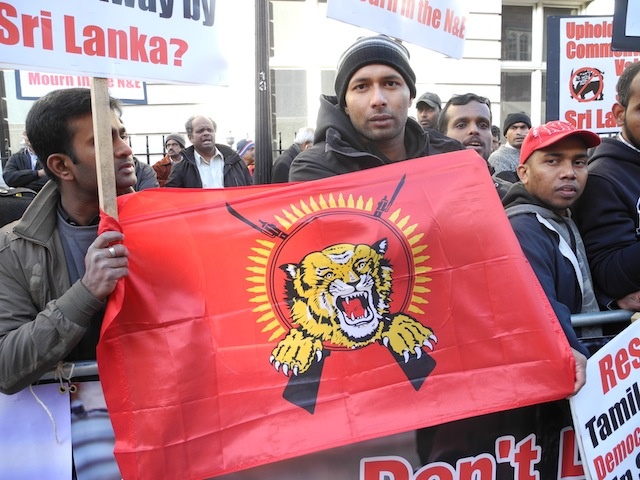
Nimalan Nadarajah: Yes, I’ve supported the Tamil Tigers since I was very young – they're the only group fighting for Tamils' rights. When I was at school, I fundraised for them. I was captured and tortured by the Sri Lankan army for two months in a military camp when I was 17. They hung me by my feet and submerged me in a well. My friend who was with me was killed in front of me.Why are you here today?
I'm here to support the Tamils. I know that the Sri Lankan government is responsible for the death of hundreds of thousands of innocent Tamil people. We want the international community to recognise what happened and help us to achieve justice.
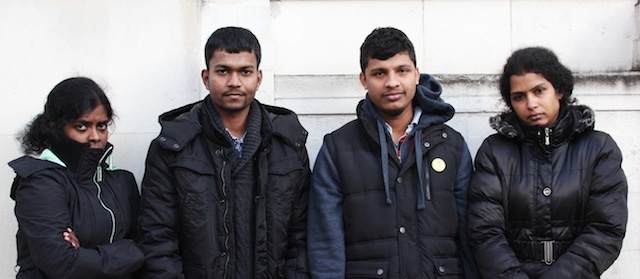
On May the 17th, 2009, a day before the war ended, Kafir planes flew over and bombed the no fire zone. The bombs were chemical weapons. Red crosses on the roof identified hospitals in the area – the government were informed where they were, but they still bombed the injured civilians. Pregnant women who had gathered in a specific area to get milk powder and food for their children were bombed. I saw a mother and her baby blown apart near me. I saw the army separate women and children and take them away; no one knows where they are. We just want justice for these war crimes.
Advertisement